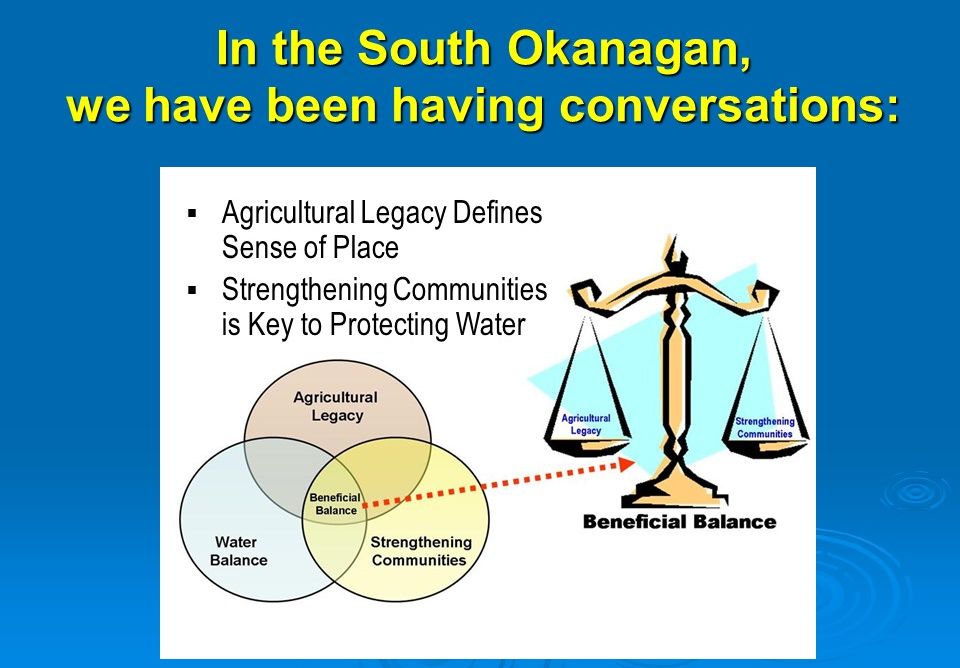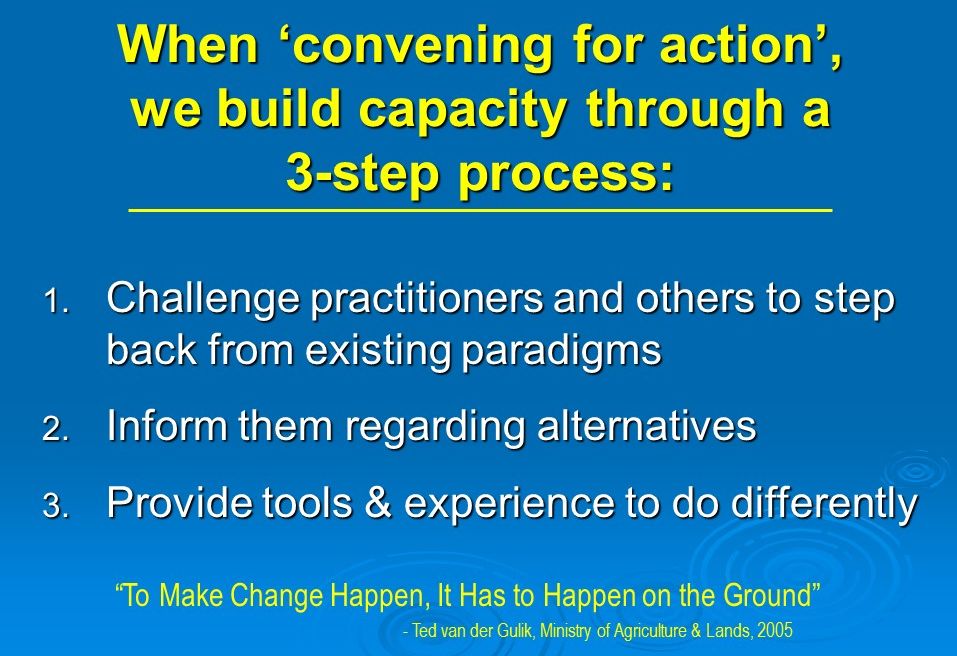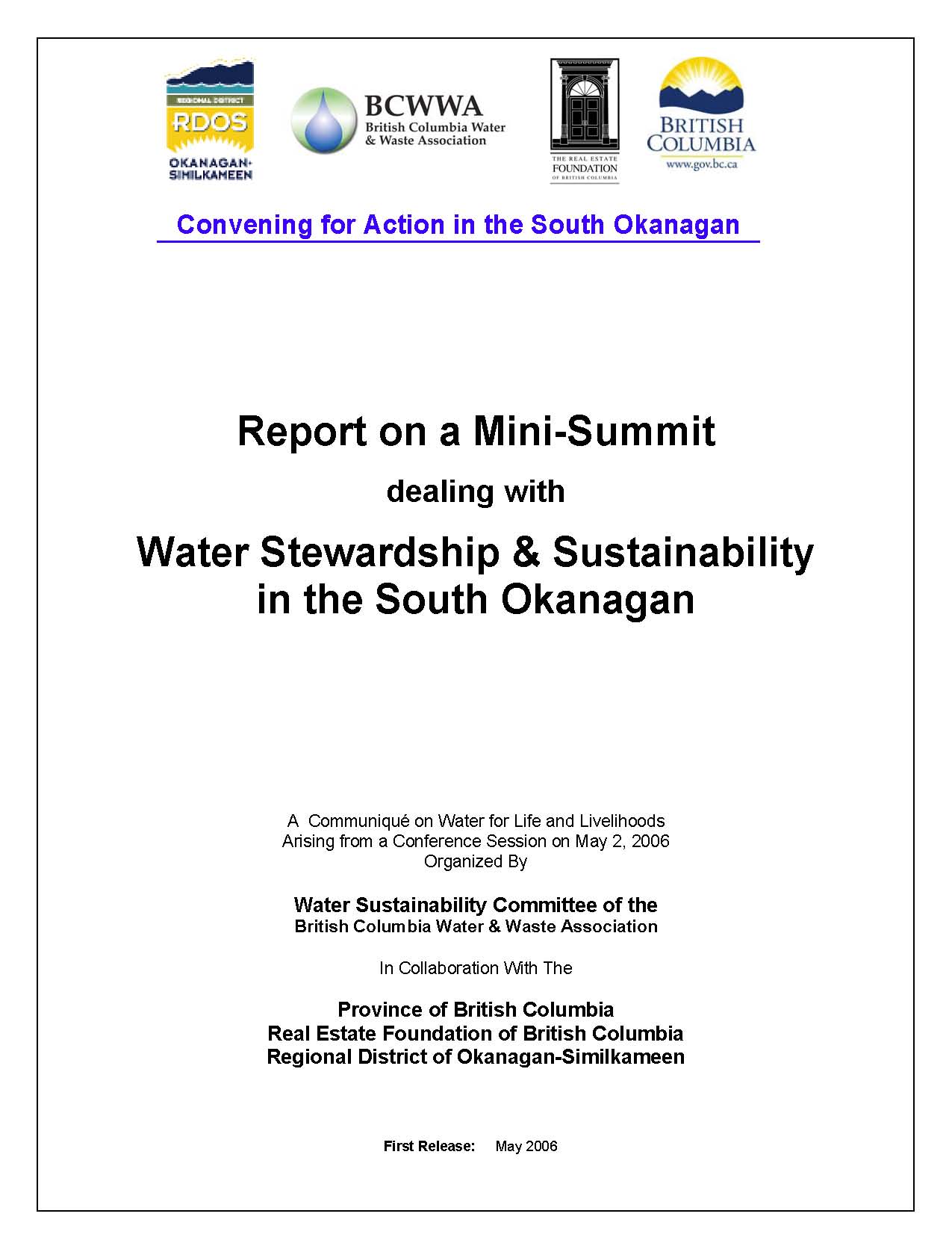FLASHBACK TO 2006: Mini-Summit on Water for Life and Livelihoods, held in Whistler, introduced the “settlement in balance with ecology” principle to focus attention on community wellbeing (May 2006)
Note to Reader:
In May 2006, the Mini-Summit held at Whistler commenced the branding process within British Columbia for use of the phrase ‘water for life and livelihoods’ to focus on what is at stake over both the short and long terms.
It was a presentation by Tim Pringle at the mini-summit that introduced the “settlement in balance with ecology” principle.
Mini-Summit on Water Stewardship & Sustainability in the South Okanagan
The Min-Summit was organized as part of the annual conference of the BC Water & Waste Association (BCWWA). This precedent-setting approach to audience participation accomplished several objectives.
- First, the fact that the conference was a provincial forum raised the profile of the South Okanagan as a provincial pilot for water-centric planning.
- Secondly, it provided the Convening for Action team with a focus group opportunity to test an approach to engaging an audience in a dialogue.
Over 100 people attended the half-day mini-summit, of which approximately 40 participated in the interactive portion.
To Learn More:
To view the program outline, including a set of mini-abstracts, click on Program for BCWWA Mini-Summit Held at Whistler
Report on the Mini-Summit
“The summit model was used because it focused on issues and responses and has resulted in an outline for action that follows from presentations on key water management themes in the South Okanagan and dialogue between presenters,  panelists and participants,” stated Erik Karlsen, Mini-Summit moderator and the co-lead for the Convening for Action initiative.
panelists and participants,” stated Erik Karlsen, Mini-Summit moderator and the co-lead for the Convening for Action initiative.
“Convening for Action in the South Okanagan is a provincial pilot for planning with a view to water.”
“An over-arching goal is to establish a precedent at the sub-basin (or sub-regional) scale for implementation of a ‘water-centric’ approach to community planning.”
“At the core of the approach is a water balance way of thinking and acting. This is very much a bottom-up approach that seeks to understand through active listening.”
To Learn More:
Download the Report on a Mini-Summit Dealing with Water Stewardship & Sustainability in the South Okanagan to read the communique arising from the Mini-Summit.
The report was co-authored by Erik Karlsen (formerly with the BC Ministry of Municipal Affairs) and Kim Stephens (Program Coordinator, Water Sustainability Action Plan for British Columbia). In 2006, they were the co-leads for the Convening for Action initiative.
Communities in Transition:
Balancing Settlement and Ecology
Tim Pringle, then the Executive Director of the Real Estate Foundation for BC, informed the audience about the Communities in Transition partnership. This initiative supported values-based planning processes that are aimed at a balanced approach to achieving social, environmental, economic well-being — with inclusive and accountable governance — in non-metropolitan areas of BC.
— with inclusive and accountable governance — in non-metropolitan areas of BC.
“The phrase water for life and livelihoods conveys the fundamental principles of sustainability of natural systems in their own right and in relation to the health and well-being of people who benefit from the use of water for basic life needs and economic activity,” explained Tim Pringle.
“Building on the water for life and livelihood theme, the mini-summit introduced the “settlement in balance with ecology” principle in order to focus attention on two fundamental questions:
- How does the community weigh the benefits and liabilities of change driven by demand for land use?
- What will determine long-term wellbeing for a community or region?”
“Wellbeing is about sustainability of what communities allow or prevent happening on the land. Wellbeing is about balancing settlement activity and ecology.”
“Healthy systems thrive. Compromised systems, without elimination of threats and restoration, decay.”





